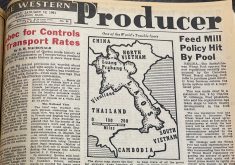Agriculture Canada tried to impose media talking points on the Canadian Food Inspection Agency for the public release of a study that examined glyphosate levels in Canadian food.
Before the study’s release, CFIA provided the Grains Roundtable an overview of the study’s findings on April 10, 2017, according to an Agriculture Canada internal report obtained through a Freedom of Information request.
The day after this meeting, Ag Canada organized a call with CFIA communications and public affairs, CFIA science branch, and Health Canada’s communications and public affairs branch to discuss the concerns registered at the Grains Roundtable, the planned release date, and the appropriate communication material.
Read Also

Proactive approach best bet with looming catastrophes
The Pan-Canadian Action Plan on African swine fever has been developed to avoid the worst case scenario — a total loss ofmarket access.
A few days after this meeting Ken Hester, sector specialist of soybeans and pulses at Ag Canada, provided an email briefing on the “proposed changes to the CFIA media lines,” Ken Hester wrote in an email obtained through the same FOI request.
“I’m also opening a pool on whether CFIA will accept any of our proposed changes to the media lines. Entry is $5 and we are betting on the number of changes they will accept.”
On the CFIA’s website it states, “we maintain our regulatory independence from all external stakeholders.”
This may be true, but it’s naive to think CFIA scientists can perform their work and get it into the public sphere without bureaucrats betting on whether or not they can get their own talking points in during the study’s public release.
There is no evidence of outside influence on this CFIA study, but we live in a time of social media trolls and keyboard warriors. It’s unwise to leave any space where suspicions of our regulatory systems can linger.
The agricultural industry does need to work on how it communicates its practices to the public, but the mechanism of when and how publicly funded scientific studies are published should be off limits.
This study ended up being accidentally sent to the media by a senior CFIA staff member before the carefully crafted communication strategy could be enacted, according to the internal report.
Yet the following day, the sun still rose for the agriculture industry even though the narrative of the study’s public release was not tightly controlled.
This is because Canada has one of the safest and most respected food systems in the world that’s regulated by systems and standards derived from rigorous science.
Its critically important the public continues to trust this science remains transparent.
Contact robin.booker@producer.com

















